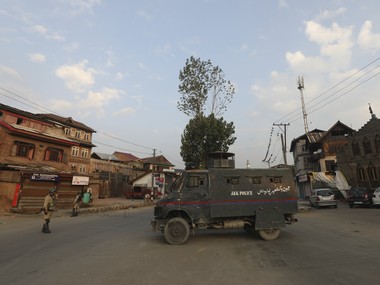The backbone of the war economy for both the Pakistani and Indian armies is the unending Kashmir conflict. Leaders of both countries have been unsuccessful in their attempts to resolve the issue, even as the attractive mantra of patriotism has overcome human values. The Line of Control is the boundary that has seen the longest shelling, historically. Full-fledged wars, hundreds of skirmishes, border violations and infiltrations, air strikes — all of these are routine in Kashmir, and from both sides.
***
After the first Kashmir War of 1947-48, a Pakistani official met Abdul Ghaffar Khan aka Bacha Khan and requested him to resolve the conflict on the government’s behalf. Khan and the then Congress leaders had struggled together for freedom from the British yoke. So staunch was Khan’s ideology of nonviolence (he was, after all, known as “Frontier Gandhi”), that even the Second World War could not compromise it — although the Congress itself was not anti-war. So Bacha Khan agreed to talk to India on behalf of Pakistani State officials. But after this one meeting, there was silence. Powerful people wanted Kashmir to be an unresolved issue, a conflict zone. Follow all the latest updates from Kashmir here After Muhammad Ali Jinnah’s demise, the Muslim League became the domain of extreme right-wingers: Those who weren’t rooted with the masses, and wanted to keep the power hierarchy within a defined circle. The party’s policymakers convinced the then Pakistani prime minister Liaqat Ali Khan to not make a hero of Bacha Khan. History afforded another golden opportunity for the crisis to be resolved in the early 1960s, when Jawaharlal Nehru also requested Bacha Khan to take the initiative in easing the stalemate between India and Pakistan. Khan, once again, agreed. He spoke with officials in Pakistan who had shown willingness to resolve the issue when unfortunately, Nehru’s sudden demise brought an end to it all. Then, during the Shimla Agreement of 1972, Zulfiqar Ali Bhutto asked Bacha Khan’s son and president of National Awami Party, Wali Khan, to send his party members along with a delegation to India; Wali Khan was known to have friendly connections with the Congress. Although Pakistan had lost half its territory and the nation itself was demoralised after the 1971 war, Khan sent two of his colleagues despite the many differences between [his and Bhutto’s] political parties.
***
Bacha Khan favoured a united Hindustan and wasn’t in support of Partition. Later, he preached for a secular, democratic and constitutional Pakistan, which didn’t come to fruition in his lifetime, and certainly hasn’t even today. For his part in the Freedom Struggle against the British, he was jailed for 14 years. But in an independent country, he spent over 17 years in prison. [caption id=“attachment_7126711” align=“alignleft” width=“380”] An armored vehicle is parked in the middle of a deserted street during curfew in central Srinagar. AP[/caption] The generation of Pakistanis growing up during the Soviet-Afghan War were kept deliberately in the dark about the value of democracy and the concept of a secular State. They were even taught via textbooks and media content that modern democratic values are “anti-religion”. During the General Zia ul Haq era of militarisation, as also Pakistan’s role in creating the Afghan Taliban, the State was working on the minds of the people to make them internalise and accept these gradual but planned changes. Bacha Khan and his son Wali Khan stood against this unnatural change, but religious propaganda from the mosques proved to be much too powerful. The foundation of this very State was and is so fragile that the masses are not allowed to ask questions. Unfortunately, the current Indian government is also creating a similarly suffocating atmosphere. Prime Minister Narendra Modi’s government has revoked the autonomous constitutional right of Kashmiris, which was a bond of trust between India and Kashmir. The decision has made the Muslim-majority region vulnerable constitutionally and they consider their autonomy has been buried. In Pakistan, before this annexation or merger decision by the Indian government, Awami National Party workers would cite India as an example of a safe, secular and tolerant nation. Party leaders and even street-level organisers would remind the people that Bacha Khan’s struggle too had been for a free democratic state, where everyone could live with his/her faith and ideology. But after this act by the Modi government, it appears India too is following a variant of Zia’s fundamentalism, under an elected prime minister. Bacha Khan and his followers would advise the two states of India and Pakistan to allow Kashmiris to decide for themselves. Kashmir belongs to Kashmiris, not to India or Pakistan — this is his followers’ stance, and they are vehemently opposed to the use of force in any part of the world, including Kashmir. Is this the murder of great democracy? Did Amit Shah shatter the dream of Mahatma Gandhi? Is India following its neighbour’s intolerant approach? Pakistanis have paid a high price for supporting violence and spurning the nonviolent philosophy of our elders. In my opinion, the developments in India are a replica of what we have witnessed and experienced in Pakistan after sidelining the idea of democracy. Even now, we live through a fascist era where sane voices are silenced. India has time to revisit and rethink its approach. To see Mahatma Gandhi’s India turn exclusionist and intolerant would be a travesty. The author is Pakistani journalist. He tweets
@theraufkhan


)

)
)
)
)
)
)
)
)



